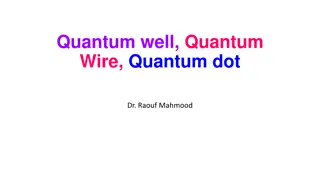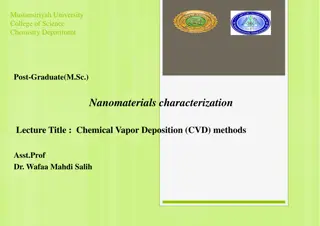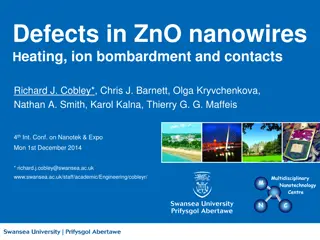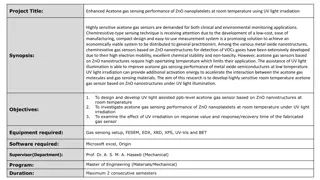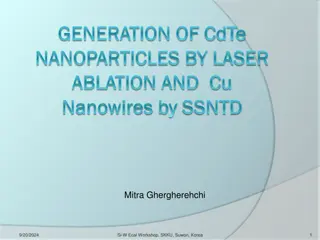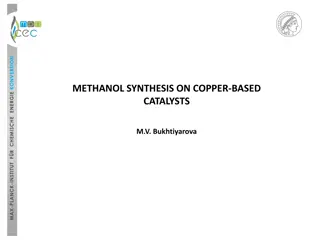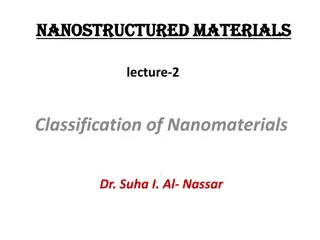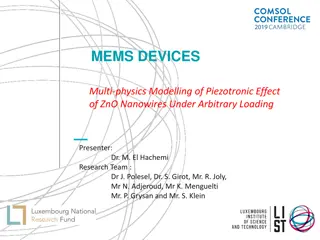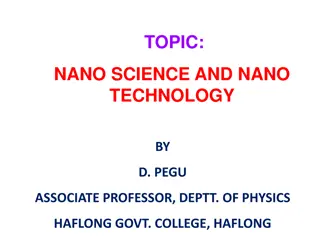Cutting-Edge Swift Heavy Ion Materials Research Retreat
Explore the forefront of materials research with Swift Heavy Ions in a retreat led by Mara Eugenia Toimil-Molares. Activities include studying ion-track nanotechnology, functional membranes, nanowires, and more under extreme conditions. Don't miss the chance to dive deep into the world of complex an
2 views • 28 slides
Understanding Quantum Wires and Nanowires: Properties and Applications
Quantum wires, quantum dots, and nanowires are essential components in nanotechnology due to their unique properties and applications. Quantum wires are one-dimensional systems with restricted electron movement, while quantum dots are zero-dimensional, limiting electron movement in all dimensions. N
3 views • 12 slides
Chemical Vapor Deposition (CVD) Methods for Nanomaterials Characterization
Chemical Vapor Deposition (CVD) is a widely used method in the field of nanomaterial synthesis, particularly for growing nanotubes, nanowires, and nanoparticles. The process involves decomposing a gaseous precursor on a substrate with the help of a catalyst, either predeposited or provided in the ga
3 views • 8 slides
Studies on Defects in ZnO Nanowires and Their Impact on Properties
In this research, various aspects of defects in ZnO nanowires are explored, including their formation through heating and ion bombardment, as well as the role of contacts. The investigation delves into the growth, control, and motivation of defects, showcasing the effects of processes like argon bom
0 views • 8 slides
Enhanced Acetone Gas Sensing with UV Light
Highly sensitive acetone gas sensors based on ZnO nanostructures are crucial for various applications. This project aims to develop a ppb-level acetone gas sensor using ZnO nanoplatelets at room temperature with the assistance of UV light irradiation. The research will focus on improving sensor perf
0 views • 4 slides
Laser Ablation for Generation of Nanoparticles and Nanowires: Workshop Insights
Explore the latest research on laser ablation techniques for generating nanoparticles and nanowires, presented at the Si-W Ecal Workshop in Korea. Discover the various methods, applications in solar cells and LEDs, and the use of semiconductor materials. Learn about the advanced 20-TW laser system a
0 views • 31 slides
Methanol Synthesis on Copper-Based Catalysts at Max Planck Institut
Methanol production using synthesis gas, studying CO2 hydrogenation for reduced CO2 emissions, and utilizing methanol as a hydrogen storage method are key areas of focus at the Max Planck Institut for Chemical Energy Conversion. The process involves methanol synthesis from CO2 and H2, with experimen
0 views • 19 slides
Understanding Classification of Nanomaterials and Quantum Phenomena
Nanomaterials are classified into different types such as nanocrystals and quantum dots, each exhibiting unique properties at the nanoscale. Quantum dots, zero-dimensional systems, show quantum confinement effects leading to tuneable light emission. One-dimensional structures like nanowires and nano
0 views • 18 slides
Piezotronic Effect Modelling of ZnO Nanowires Under Arbitrary Loading
Explore the multi-physics modelling of the piezotronic effect in ZnO nanowires under arbitrary loading. The research team led by Dr. M. El Hachemi presents innovative designs of micro-strain sensors and piezotronic cantilever sensors, with applications in fields like robotic manipulation and spectro
0 views • 11 slides
Exploring Nanoscience and Nanotechnology by D. Pegu
Delve into the fascinating world of nanoscience and nanotechnology as explained by D. Pegu, an associate professor at Haflong Govt. College. Learn about the fundamentals of nanophysics, nanomaterials, and nanotechnologies. Discover the impact of nanoparticles on various properties, including melting
0 views • 19 slides

